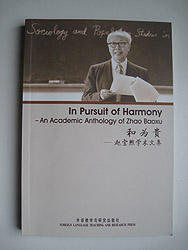|
 |
|
(COURTESY OF WANG YONG) |
Leading Chinese political scientist Zhao Baoxu has produced an overview of the evolution of China's political structure, its political studies as well as its foreign policy over the past six decades in his latest book In Pursuit of Harmony: An Academic Anthology of Zhao Baoxu. The English edition of this anthology was published by the Beijing-based Foreign Language Teaching and Research Press in November 2008. In its preface, former Chinese Foreign Minister Li Zhaoxing called it a "crystallization of a seasoned professor's research efforts over more than half a century."
In a critique for Beijing Review, Wang Yong, a professor of the School of International Studies at Peking University and Director for the Center for International Political Economy at the university, underlined the relevance and significance of Zhao's views. Edited excerpts follow:
As a preeminent scholar at Peking University and a senior advisor to the Chinese Association of Political Science, Zhao Baoxu has long been engaged in the research and teaching of political science and world politics, and has garnered great respect and accolades from academic circles throughout China and the world.
Through 21 articles, Zhao's compendium, In Pursuit of Harmony: An Academic Anthology of Zhao Baoxu, addresses important issues facing Chinese politics, as well as its economy and foreign policy. This work is comprised mainly of the English papers and lectures Zhao has presented to the international academic community since the early days of China's reform and opening up in the late 1970s. The book serves as testimony to the rapid changes in political studies in China—and in popular perceptions of Chinese politics. It offers reflections on both the "cultural revolution" (1966-76) as well as its implications for China's political restructuring.
The book collects some works about the relevant issues of Chinese political restructuring, such as one titled "A Political Transition: From the Rule of Man to the Rule of Law." Here, Zhao discusses the lessons of the "cultural revolution" and its impact on China's political restructuring. He stresses that the disaster of the "cultural revolution" has awoken the people, creating a popular demand that China must reform and open up. Moreover, he said, only by resisting the rule of man and establishing the rule of law would China be able to create a stable political environment for its economic development.
This wide consensus should be counted as a driving force behind the continual and extraordinary progress of contemporary China. On the other hand, Zhao offers a positive assessment of the democratic politics of developed countries—while emphasizing the importance of the coexistence of different development models.
Several articles explore the recovery and development of political science in China. These were written between 1982 and 2001, and published in the academic journals of the United States and other countries. Zhao went on to review the fate of political science in China—from its creation and development to its interruption, as well as its resumption, following the launch of reform and opening up.
In 1982, he gave a speech titled the "Renaissance of Political Science in China" at the University of California, Berkeley. With an honest outlook, his speech offered an interpretation of the historical background of the abolition of political science in China. In it, Zhao pointed out that the reconstruction of China's social sciences during the 1950s was based on a Soviet model—rather, scholars in post-revolutionary China were instructed to cease studying political science, as Soviet scholars were not actively pursuing this subject.
"In the past 30 years," Zhao wrote, "a series of historical and political events have shown the abolition of the independent scientific research of political science is a mistake." Partly because of this abolition, he added, serious mistakes including the "cultural revolution" were committed in China.
Zhao bemoans the rise and fall of political science in China. He does so by illustrating how both it linked to and constrained by the realities of China—in addition to arguing that "the closer the development of social sciences is linked to political reality, the more susceptible to interference from political realities the political science would be."
However, Zhao added his firm belief that the future of political science in China will be bright.
In his discussion of Chinese foreign policy, Zhao offered his own insightful analysis about the key factors of "revolution" and "development" at the different times of China's foreign relations. He also offers reflections on the similarities and differences between the diplomatic styles of Mao Zedong and Deng Xiaoping—and, more recently, about the very policy concept of "a harmonious world" and its association with traditional Chinese culture.
| 